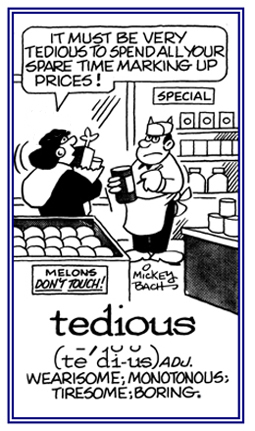tedi-
(Latin: weary; boring; irksome; dull, dreary; monotonous)
As a mother of three, Jackie often has tedious work to do in her house, but it needs to be done.
The long tedious talk that the commentator made did not help his TV viewers have any interest in what he was talking about.
2. Conveying a dull, monotonous, unexciting, or unimaginative situation or activity: The tedious stage drama put the audience to sleep.Being tedious refers to a boring person who continues to talk long after his brain has ceased working.

Go to this Word A Day Revisited Index
so you can see more of Mickey Bach's cartoons.
Jim found out that there are many tediously difficult ways to remove old putty from window frames.
Tedium suggests a repression of energy because of a lack of a proper or an adequate outlet and a dullness of spirits resulting in stupefying inactivity or monotony and a lack of interest that can cause psychological melancholy.
2. The quality of being dull, boring, and dreary: Shirley couldn't face the tedium of five more years at the same job despite the fact that computers could relieve some of the tedium of taking notes.3. Etymology: from Latin taedium a form of taedere, "to vex, to make weary".
A bore is a fellow talker who can change the subject to his topic of conversation faster than you can change it back to yours.
